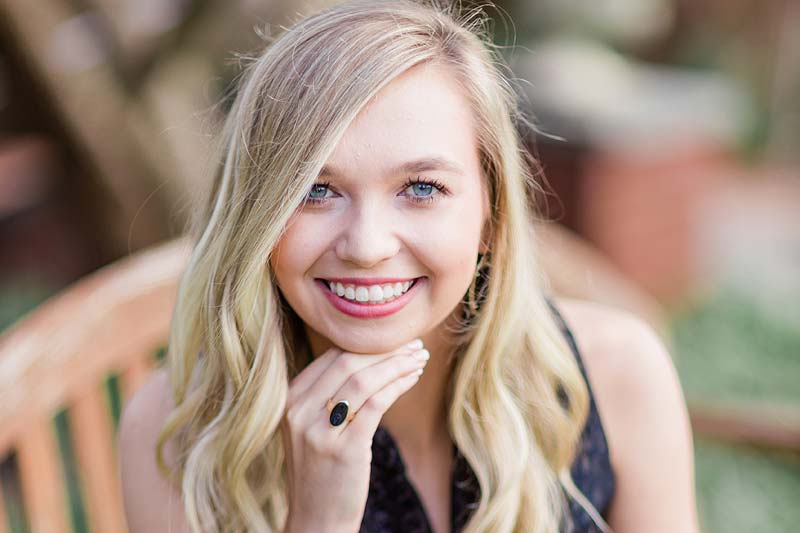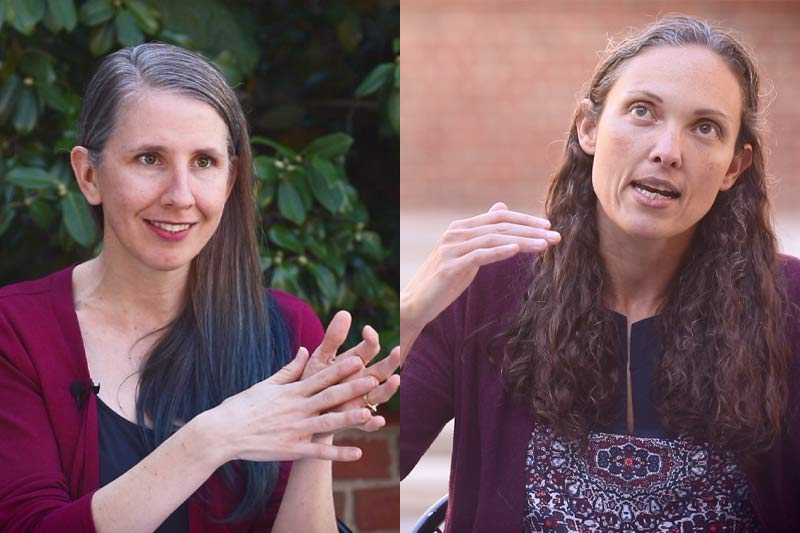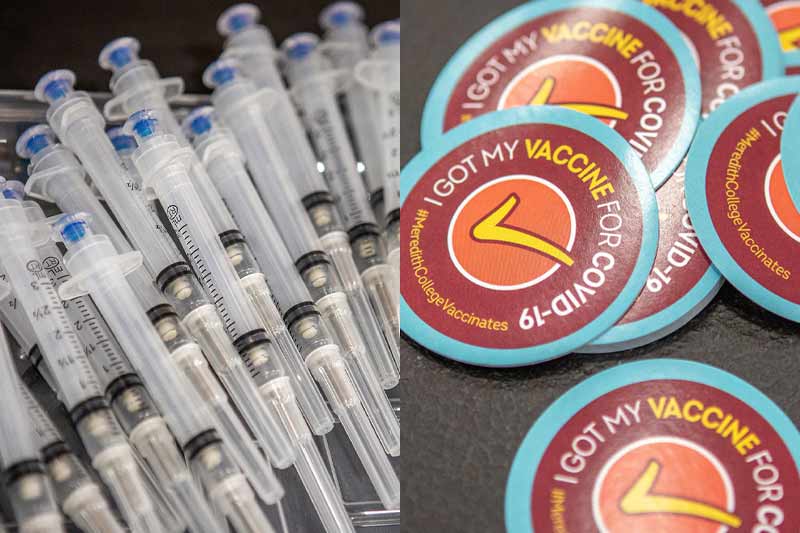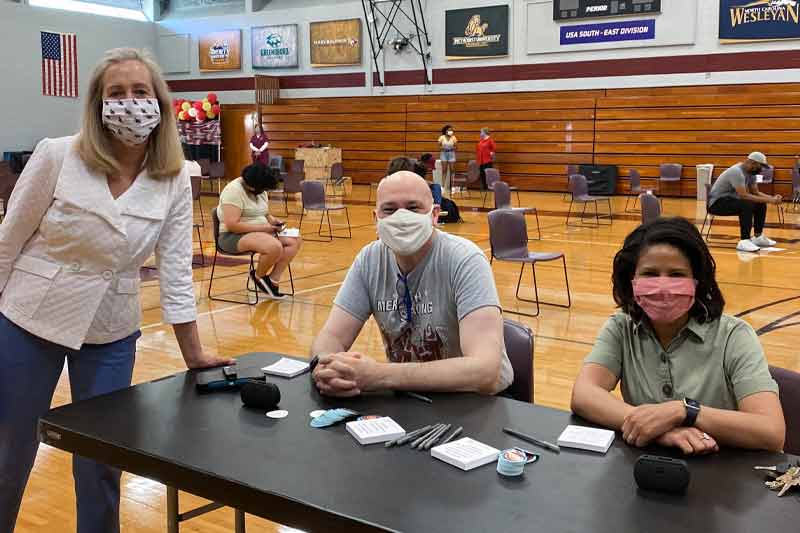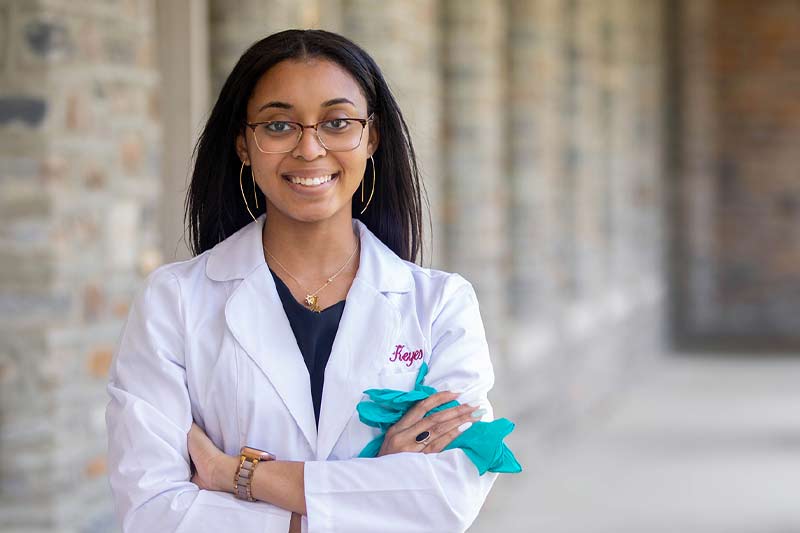Being A Part of the Solution
Meredith Community Contributes to Vaccine Research and Education
By Cailyn Whitman, ’18| Videographer: Charlotte McKinney
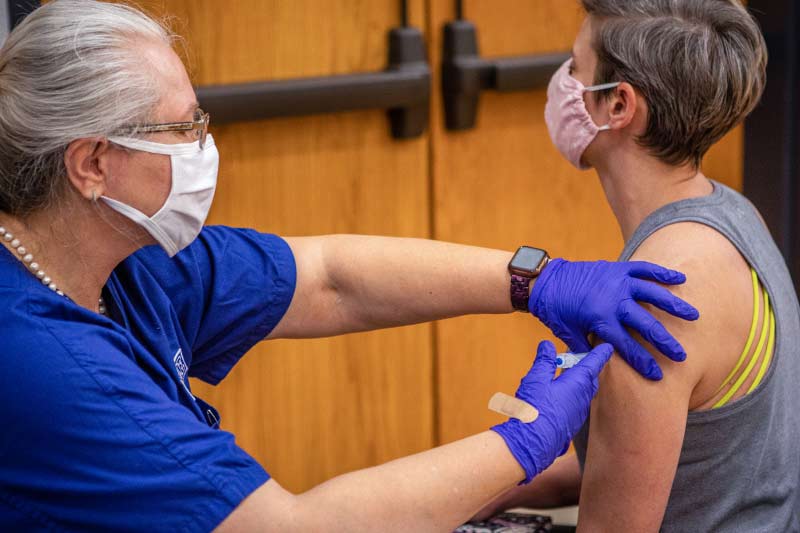
Being A Part of the Solution
Meredith Community Contributes to Vaccine Research and Education
By Cailyn Whitman, '18
Slowing the spread of COVID-19 has been and continues to be an all-hands-on-deck effort at Meredith and beyond. Wearing a mask, social distancing, spending more time at home – these are all necessary ways individuals have stepped up to help. But many have taken on even greater responsibilities to help bring the pandemic to an end. From vaccine research and development, to education on the benefits of the vaccine, faculty and staff, alumnae, and students have made remarkable contributions.
How One Student’s Undergraduate Research Findings Helped Meredith Mitigate Vaccine Hesitancy
Public health and biology major Kelsieanne Schmidt, ’21, conducted research on vaccine hesitancy among undergraduate students at Meredith.
Kelsieanne Schmidt, ’21
“When I started this project in the fall of 2020, COVID-19 vaccines were projected to become available at the beginning of 2021,” said Schmidt. “At the time, there was very little known about college students’ acceptability of a vaccine. My goal was to create a study to further benefit the Meredith community by identifying and addressing any perceived barriers.”
After completing the research, Schmidt was tasked with presenting her findings to Meredith’s vaccine planning team. “This allowed us to take a deeper look at future steps Meredith could take to promote vaccine acceptance,” said Schmidt.
Schmidt’s findings were instrumental in the development of an educational webinar on COVID-19 vaccines that was made available to students, faculty and staff, and alumnae/i. Associate Professor of Biological Sciences Carolina Perez-Heydrich, Schidmt’s adviser and coordinator of the public health program, worked with faculty from the biology department to help produce the webinar.
“We highlighted the importance of vaccines for both individuals and the broader community, how vaccines work to help build protection against disease-causing agents, and how current mRNA vaccines were developed within a relatively short time frame,” said Perez-Heydrich.
The webinar also included a session where viewers could ask questions of the panelists. “Paneled by biology faculty, along with Director of Health Services Mary Johnson, ’07, and Director for Human Resources Pam Davis Galloway, we answered questions and addressed concerns surrounding some of the information others had read or heard about through social media regarding the vaccine,” said Perez-Heydrich.
Schmidt and Perez-Heydrich are continuing their research by conducting a survey to measure the effectiveness of the webinar. As they await results, the research they’ve already completed continues to aid the College in educating the community effectively as more vaccines become available. Also, the two are currently in the process of writing up Schmidt’s results into a manuscript for publication that can be more widely shared among college health and wellness professionals.
For Schmidt, the opportunity to conduct and present this research was a valuable experience in her career and further solidified her interest in public health. “I believe vaccine education is extremely beneficial because it allows students to increase their knowledge, form positive attitudes, and develop self-efficacy,” she said. “It is important for students to have the opportunity to make educated decisions about their health, and I am humbled to have made that possible for the Meredith community.”
Faculty Co-Taught Course on the History of Pandemics
Amy O’Keefe (left) and Carolina Perez-Heydrich (right).
Perez-Heydrich’s efforts to mitigate vaccine hesitancy extended to her classroom as well. In the spring, she co-taught an honors colloquium course with Assistant Professor of History Amy O’Keefe on the history of pandemics. The two faculty members also shared their expertise in a Campus Conversations video.
“In an effort to raise student awareness about the importance of vaccines and the barriers that have obstructed vaccine campaigns in the past, we developed a project where students could explore how socio-cultural, environmental, institutional, economic, or political factors contributed to vaccine hesitancy across multiple historical contexts,” said Perez-Heydrich. “The idea behind this was to provide students with the opportunity to reflect on how the current issues we experience surrounding vaccine hesitancy have also been issues obstructing vaccination campaigns in the past.”
By teaching their students to view these issues through a more objective, historic lens, Perez-Heydrich and O’Keefe hoped students would learn to identify their contemporary variants more readily and would be less susceptible to modern-day misinformation campaigns.
Director of Health Services Leads the Way for Successful Vaccine Rollout on Meredith’s Campus
Meredith’s Director of Health Services Mary Johnson has played a key leadership role in educating the Meredith community on vaccines and the virus in general. Ever since the pandemic began, she has attended COVID-19 response meetings on a weekly basis with state and local officials.
“I’ve helped draft content, kept Meredith’s Incident Response Team (IRT) updated on national, state, and local vaccine information, and supported educational events such as our webinar in February,” she said.
Johnson has been working with members of IRT since late last summer to try and envision what the vaccine rollout would look like on Meredith’s campus. On April 7, that vision finally came to life when a vaccine clinic was held on campus. The clinic was organized by Meredith’s Student Health Center and was open to students, faculty, and staff.
Chaplain Stacy Pardue, Provost Matthew Poslusny, and Director of Advancement Services Astra Ball were among the volunteers helping make Meredith’s vaccine clinic a success. (Photo: Kristi Eaves-McLennan, ’14, MBA)
Alumnae, Faculty Support Vaccine Development and Research
Other members of the Meredith community have contributed to research and development of the vaccine. For example, Cathie Ostrowski, Director of the Dietetic Internship Program at Meredith, volunteered to participate in a COVID-19 clinical trial conducted by Pfizer.
When asked what inspired her to participate in the study, Ostrowski said she wanted to be involved in the cutting edge science of mRNA vaccines, but she had personal reasons for participating, too.
“COVID-19 is a scary and unpredictable virus, so I was hoping to get the vaccine and possibly protect myself and my family,” she said.
As someone who has completed clinical trials before, Ostrowski said the process was easy and involved little commitment. Even still, the larger picture shows that it is because of people like Ostrowski that researchers have been able to develop a safe and effective vaccine at record speed.
Meredith alumnae have also been involved in vaccine research and development through their careers. As a research technician for a lab at Duke Health, Taylor Keyes, ’19, has studied the virus extensively.
Taylor Keyes, ’19
“In a week’s time, I can infect cells with the virus, harvest the cells, and perform experiments to determine whether various antibodies are capable of binding to the infected cells,” said Keyes. “I can also look at serum from COVID-19 patients and assess how ‘infected’ they are.”
As more and more people receive the vaccine, Keyes finds it rewarding to know she has been a part of the solution. “The thing I love the most about working in vaccine development is knowing that what I’m doing is working towards creating a better future,” she said.
Nicole De Naeyer, ’17, is another alumna who has played a direct role in the research and development of a vaccine. As a lab analyst for the Duke Human Vaccine Institute, her work over the last year and a half has focused almost solely on COVID-19 vaccine research.
De Naeyer also helped conduct research on the effectiveness of surveillance testing on college campuses, a tactic that many schools, including Meredith, have adopted. The findings from that research were published in the CDC’s Morbidity and Mortality Weekly Report in November.
Because of De Nayer’s close proximity to the virus as a frontline worker, she was one of the first to receive the vaccine in December 2020.
“Getting the notification that I was eligible for a vaccine was like seeing the first rays of light at the end of the tunnel,” she said. “And while I recognize that I was privileged to be one of the first in line, it gave me immense hope that we are nearing the beginning of the end.”
As the COVID-19 vaccine continues to roll out across North Carolina and beyond, Meredith College salutes those who made the treatment and the acceptance of it possible. From student researchers, to expert faculty, to virologists and clinical trial volunteers – their hard work is making a collective impact towards a safer future.

